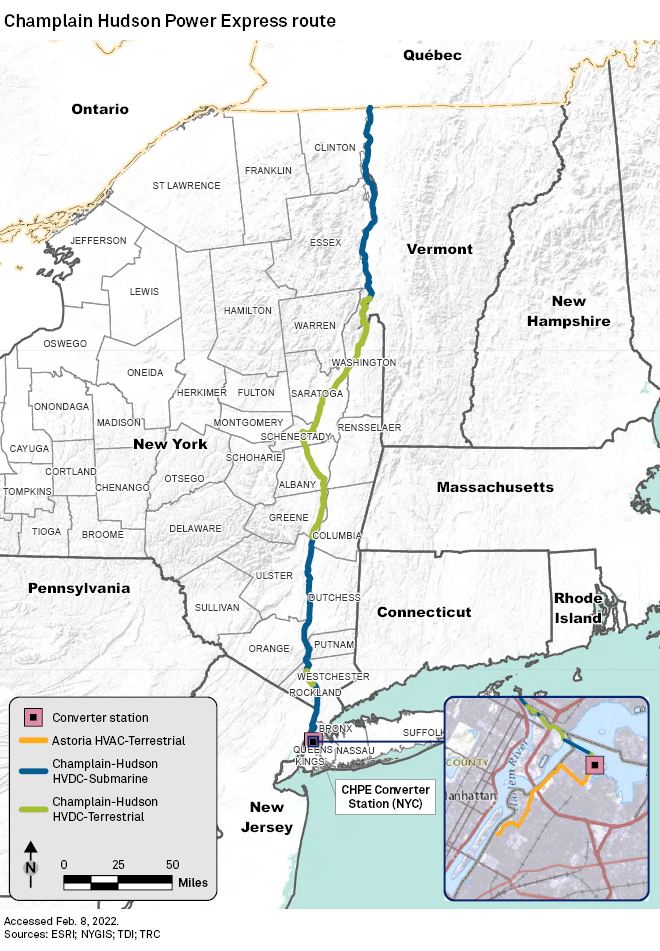S&P Global Offerings
Featured Topics
Featured Products
Events
S&P Global Offerings
Featured Topics
Featured Products
Events
S&P Global Offerings
Featured Topics
Featured Products
Events
Banking & Capital Markets
Economy & Finance
Energy Transition & Sustainability
Technology & Innovation
Podcasts & Newsletters
Banking & Capital Markets
Economy & Finance
Energy Transition & Sustainability
Technology & Innovation
Podcasts & Newsletters
S&P Global Offerings
Featured Topics
Featured Products
Events
8 Feb, 2022

By Allison Good
A major environmental group urged New York regulators to reject a proposed underground transmission line that would carry power from Hydro-Québec's wind and hydroelectric resources to New York City, saying the project has "fatal flaws."
The 1,250-MW Champlain Hudson Power Express project, under development by Blackstone Inc.-backed Transmission Developers Inc. was selected in 2021 by the New York State Energy Research and Development Authority under its Tier 4 renewable power solicitation as one of two major transmission projects to carry renewable power to New York City.
In a Feb. 7 letter to the New York Public Service Commission, the environmental group Riverkeeper said building the high-voltage direct-current line could cause environmental harm and may not reduce carbon emissions. The line would run about 330 miles from the Canadian border and into the city primarily under the Hudson River and along existing rail lines. (Case 15-E-0302).
"Hydropower in general is not low carbon," the group wrote. "Dams transform natural landscapes into reservoirs. Many natural landscapes function as carbon sinks, and their inundation not only causes a loss of these natural sinks, but also results in a large and ongoing flux of greenhouse gas emissions."
 |
Since the contract term for the transmission line goes beyond 2040, those emissions directly violate the New York State Climate Action Council Draft Scoping Plan, which targets generating 100% of electric power from zero-emissions sources by that year, Riverkeeper said.
The group urged the New York Public Service Commission to reject the project and select an alternative that relies on renewable power other than hydro, preferably generated in New York, and to choose a route that minimizes its reliance on the Hudson River.
Although Riverkeeper acknowledged it previously negotiated a settlement with the transmission project's developers as an "essential alternative" to the Indian Point nuclear plant, the last reactor of which retired in 2021, the group said it has "had the courage to take a second hard look at this project."
"The PSC, too, must take this hard look and change course before it wastes billions of taxpayer dollars on a false climate solution that violates environmental justice principles," Riverkeeper wrote.
Guggenheim Securities LLC described the new opposition as "very much a stay-tuned situation."
"We expect this could get noisier," Guggenheim analysts wrote Feb. 8. "At a higher level, the pushback points to the near impossibility of getting large transmission projects done in the northeast, with downstate NY (Zone J) perpetually constrained."
In Maine, Hydro-Québec recently suspended work on the Canadian segment of a transmission project to carry 1,200 MW of hydropower to New England. The $1 billion New England Clean Energy Connect project stalled following a Maine referendum in which 59% of state voters rejected the transmission project.
Avangrid Inc. subsidiary and partner developer NECEC Transmission LLC, which are developing the line's U.S. segment, announced in December 2021 that they were halting construction after the Maine Department of Environmental Protection suspended a key permit the month prior. Avangrid, NECEC and Hydro-Québec have joined in a lawsuit filed in Maine Superior Court arguing the referendum violated multiple legal principles.
Congress aimed to ease permitting of large regional and interregional transmission projects under the $1.2 trillion bipartisan infrastructure bill passed in November 2021 through a provision allowing the Federal Energy Regulatory Commission to approve certain projects in national-interest electric transmission corridors if a state commission denies approval for the project or has not decided on an application.
Environmental opposition to both the New England Clean Energy Connect and the Champlain Hudson transmission lines suggests significant permitting and political hurdles persist.
"It doesn't appear that policies ... that have recently been enacted in the infrastructure package have tackled the real issues that are slowing projects," Timothy Fox, vice president of alternative power and energy efficiency at ClearView Energy Partners LLC, said in an interview.
